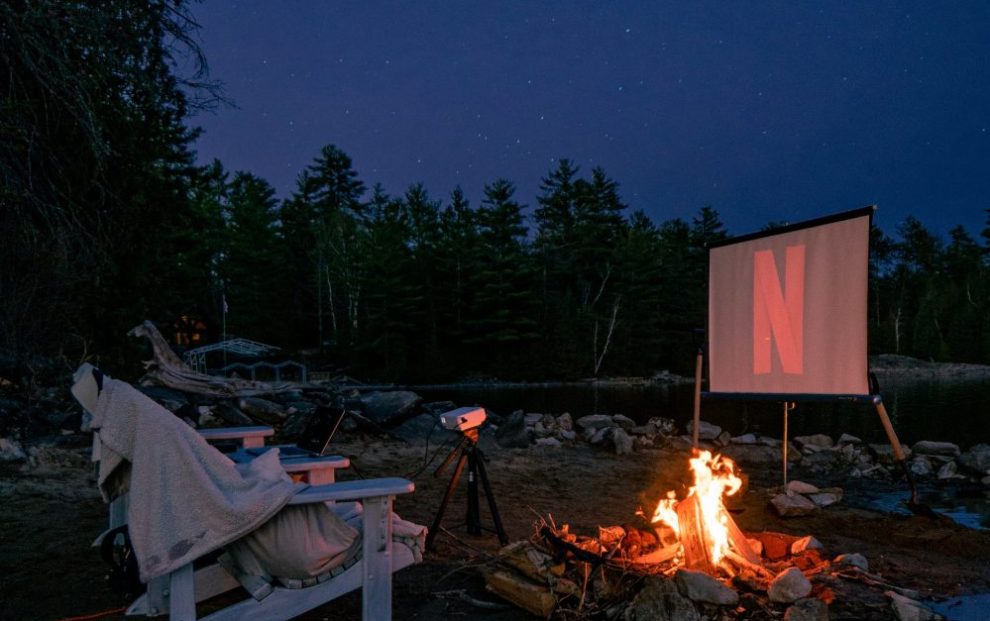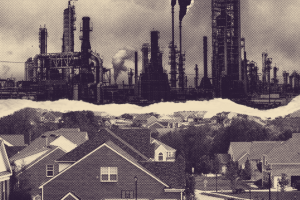Growing up in Manila, the bustling capital of the Philippines, Precious Blood Brother Antonio D. Sison found a reflective space in the cineplex. “I consider film as my first spiritual director,” he says, noting that time spent at the cinema opened his eyes to new possibilities about what he could do with his life. Films helped him discover deeper meaning and a sense of calling.

Now a professor of systematic theology at Catholic Theological Union in Chicago, Sison has made it his life’s work to point out the significant impact film and visual culture can have on our spiritual lives. His work shows that through exploring stories of humanity we can better know God and better understand God in the world around us. “It makes life exciting for me,” he says about being engaged in theology and the arts.
Over the past 18 months, Sison has used this intentional engagement with film to make sense of the COVID-19 pandemic. At the beginning of the pandemic, Sison recalls having nightmares. “There was collective trauma—something hit humanity that none of us expected with such magnitude that there was no safe space on Earth,” he says. “That sounds to me like a dystopian, apocalyptic horror movie.” He found that immersing himself in films with similar themes offered a safe space within which to sort out his emotions regarding the pandemic and to ponder the future with hope.
What drove you to study film and faith?
It started early on when I was a young person growing up in Manila, the capital of the Philippines. Your possibilities are not spelled out for you very clearly when you live in a Third World context. I had the habit of going to watch films in the theater at 11 a.m., so I practically owned the theater; there were often no other viewers present.
That experience opened a portal for me to connect with God in surprising ways. It was like entering another dimension where I could sort out my questions and explore various possibilities through what was happening on-screen. Where I grew up, dreaming was a luxury that few people could afford. They knew that the chances of their dreams coming true were next to nil. But films opened up the possibility of these dreams coming true. Seeing stories unfold on-screen connected my own story with the stories I was watching.
Film has a special place as locus theologicus, as a site of theological reflection, because images produce a visceral sense of wonder that written text doesn’t necessarily elicit. Images invite reflection in a creative and imaginative way.
Yet there’s a tendency for us to be textually oriented when it comes to deep reflection. We don’t immediately go to the image. There should be a balance of logos and icon, word and image. This can lead to a rich and wide theological experience that engages our faculties in a more inclusive way.
Does a film have to be explicitly religious to say something about theology?
St. Pope John Paul II pointed out that not only religious films serve a purpose in our faith journey, but films that highlight humanity do so as well. In his homily for the Jubilee of the Entertainment World he said, “It is impossible to think of a new evangelization that does not involve . . . the world of entertainment, which is so important in forming minds and habits. I’m thinking of many initiatives which present the Bible message and the very rich heritage of the Christian tradition in the language of forms, sounds and images through the theatre, cinema and television.”
There’s a beauty in a story that taps into authentic humanity.
St. Pope John Paul II is referring to religious films. But he also says this: “I am also thinking of those works and programmes that are not explicitly religious but are still capable of speaking to peoples’ [sic] hearts, prompting them to wonder, to question and to reflect.”
The human being has an inner narrative structure. We connect with meaningful images that translate as logos, narrative, and story—whether they are explicitly religious or not. Films about humanity and human experience invite us to reflect and to wonder, and I think these are the films that are worth our time and reflection.
For example, October Sky (1999) is a very special film for me. It’s not even an artsy film; it’s very commercial. The film is based on a novel, Rocket Boys (Delacorte Press), about a young kid growing up in a coal-mining town who is expected to follow his dad’s wishes and to become a miner himself. And then he starts to experiment with flying rockets. His dad is upset that he isn’t going to be a coal miner, and the boy is the laughingstock of the town until he flies that rocket so high it disappears as a dot in the sky while the whole town watches.
Watching that film is a sacramental moment for me. There’s a beauty in a story that taps into authentic humanity, where human beings journey into answers that are not forthcoming, face struggles, venture into the unknown, and find a positive narrative even though what’s in front of them is a negative and ugly narrative. October Sky is relatable because we all go through that journey, that experience, regardless of culture or race or any other borders separating us.
So film can teach us about authentic humanity. Can it also teach us about God?
The most immediate encounter we have with God is through human experience. We don’t know God except within the water in which we swim, which is the water of human experience. God is not some abstract thing that pops up in our minds and that we deduce from logic. For most of us, at least, we discover God within the very sphere of human experience, where we also experience our imperfect lives, our finitude, and our limitations as human beings. We find that in our limitation we are not God, and by virtue of that we know who God is: Jesus Christ is the aspiration of what it is to be authentically human.
There’s a universality to stories where the “religious” comes in unexpectedly. It comes from exploring what is deeply human, what Catholics call imago Dei—the idea all human beings are mirrors of God—and that comes when we discover our authenticity amid the shadows of the world. That’s how I see God in films that portray genuine humanity.
What’s a film that does a good job of showing humans as imago Dei?
The first film that comes to my mind is Pope Francis’ favorite film, Babette’s Feast (1987). It’s the only film that has ever appeared in a papal encyclical—in Amoris Laetitia (On Love in the Family) Pope Francis talks about generosity and finding joy in giving a gift to another person and finding the light in the person who receives that gift.
Film is sacramental in that sense: It invites us to discover who God is in the human.
Advertisement
My first reaction to Babette’s Feast was: What a beautiful thing to be a human being. This realization comes from the story’s simplicity and authenticity. Two sisters, raised by a strict pastor, do away with the luxuries and comforts of life and live as hermits on a small island in Denmark. Suddenly, a stranger appears at their door: Her name is Babette. She’s a French woman, and she offers to be a servant in exchange for shelter.
Little do the sisters know that the servant who cooks their meals and cleans their house for 11 years is France’s premier chef. One day Babette wins the lottery and splurges on a lavish French meal for the sisters and their guests. It’s shocking to the sisters, who live practically as ascetics. Then, in the abundance of the feast, they discover something new: Amid lost loves and unfulfilled dreams, life is truly a gift to be cherished and savored. The meal is about 40 percent of the film.
Babette’s Feast interweaves many other dimensions of what we identify as a faith experience. For example, the central meal invites us to reflect on how important meals are in Jesus’ fellowship. There’s a eucharistic dimension too: Bread is broken and shared in a community in remembrance of Jesus, and the film demonstrates the generosity of a gift from the heart that knows no limitations. These things come together in a beautiful tapestry that weaves for us a parable, essentially, of God as an overabundance of love and generosity.
Babette’s Feast does this in an effortless way. It doesn’t rely on a lot of special effects or crazy camera angles. In fact, the camera is a compassionate observer that gives us insight into the characters’ lives. Babette does mundane things: preparing food, washing vegetables, cutting meat, and cooking. You can sense reverence in these acts: They are almost ritualized, not done in a haphazard fashion or taken for granted. The camera spends a lot of time compassionately watching—compassionate in the sense that there’s respect for what’s unfolding even though it’s not spectacle. God’s presence is palpable in the ordinary. Film is sacramental in that sense: It invites us to discover who God is in the human.
Babette’s Feast takes place in a desolate setting, and there are many recent films and TV shows set in far more desolate or dystopian realities. Why are these types of settings so popular lately?
There’s a connection between the signs of the times and what we see on-screen. When there’s a cataclysmic event such as a pandemic, people tend to watch horror or dystopian films—films about the end of the world, apocalyptic films, films about aliens or getting lost in space. I think people connect with films in this way because they need catharsis. They need to connect with something that gives them a safe space to sort out their inner fears. And that virtual space is cinema.
The pandemic was a great unknown for many of us. That first month after it broke out there wasn’t a lot of science. People died rapidly; the deaths came closer and closer to home. It’s natural for people to gravitate toward films that help them sort out their feelings. Film is a reflective space for what’s happening around us.
Film is a reflective space for what’s happening around us.
The films I watched when the pandemic first broke out include 2001: A Space Odyssey (1968; one of my all-time favorites), Blade Runner 2049 (2017), Avengers: Endgame (2019), and Arrival (2016), all of which are apocalyptic. And then there was this African film, The Boy Who Harnessed the Wind (2019). It’s dystopian but not in an apocalyptic sense: It’s a true-to-life story of the unbelievable challenges someone on the edge of the world must go through just to get water to his village. It decentered me, made me think of people who have it worse than me, and reminded me to look at a world outside of my circle.
These films make you treasure hunt for hope in stories that aren’t hard selling hope. The pandemic requires a lot of reflection. There’s certainly a place for more escapist fare; I enjoy those myself. But I find hiding at home and muffling the dissonance around me with movie laughter while the world is perishing an inadequate response to suffering. After all, we are called to read the signs of the times and reflect on them in the light of God’s word.
Can we still learn about God from stories that seem so godless?
Absolutely. Because God is beyond what human conception can grasp, we will always fall short of describing God in affirmatives. But we can understand God by negation, which means we can have insight about God by being face-to-face with what God is not.
An image of destruction or absolute horror opens an opportunity for us to reflect on what ought to be. This makes films even more exciting, because they do not involve passive viewing: They invite us to a critical conversation.
La Llorona (2019) is a Guatemalan film that is purposeful and meaningful. I have a hard time classifying it as a horror film. It has elements of horror, but it also has a point to make about a grave injustice committed against Indigenous people in Guatemala. It invites reflection on how human beings can be liberated from a situation of injustice. I was entranced by La Llorona: It redefined horror for me.
Not all films invite deep reflection, but in purposeful films God enters the picture through these conversations about how things ought to be.
Can something as ordinary as going to the movies spur us to demand justice in real life?
Movies are not manuals. They won’t tell us what to do, but they will invite us to a conversation. And if that conversation makes us more aware of structural inequality, then film becomes a liberative image that kindles in us a desire to be transformative. If film can do that, then it can help rouse our social consciences. We are brought into an awareness of the inequalities and injustices before us, and that lays down a bridge for us to do something about it. So film plays a role in moving toward justice and liberation, but we make that decision, we make that reflection.
The Motorcycle Diaries (2004) is a film about the early life of Che Guevara. Before he became a revolutionary, he was a medical student who traveled around rural areas of Latin America. In the film, you can see that the character goes through a clear set of transformative moments as he comes face-to-face with the suffering of people who are poor. That transformative journey is something I can connect with, because I see a progression, a character change at each moment where he encounters the poor, the weak, and the sick.
What connects us to characters as they go through difficult situations and emerge as authentically human is that watching them stirs echoes of our own experience. Who’s excused from struggle, from difficulties? Yet we emerge from these situations as people who have transformed. If, when characters come out on the other side of these experiences, they become more authentically human, there’s something that deeply resonates in us.
Watching these characters on-screen starts a reflection on how Christian life resists the static in dynamic ways. Human action is the natural overflow of critical and deep reflection. That’s how film can kindle possibility about what we can do to address suffering in the world.
This article also appears in the November 2021 issue of U.S. Catholic (Vol. 86, No. 11, pages 32-35). Click here to subscribe to the magazine.
Image: Unsplash/Derek Sutton














Add comment